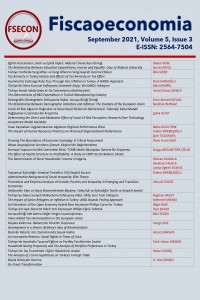Asymmetric Exchange Rate Pass-Through into Inflation in Turkey: A NARDL Approach
Asymmetric Exchange Rate Pass-Through into Inflation in Turkey: A NARDL Approach
Author(s): Nazlı Karaoğlu, Baki DemirelSubject(s): National Economy, Present Times (2010 - today), Financial Markets
Published by: Ahmet Arif Eren
Keywords: Exchange rate; Asymmetric Pass-Through; Inflation; Nonlinear ARDL;
Summary/Abstract: Inflation expectation resulting from the exchange rate increases is one of the widely discussed topics in the literature. When determining the disinflation policies, it is crucial to consider the size and duration of the exchange rate pass-through effect on inflation. The literature findings show that the high level of rises in the exchange rate pass-through much faster on inflation, especially in dollarized economies with high inflation inertia. On the other hand, it has been revealed that the relationship between exchange rate inflation is asymmetrical. The Turkish economy, which struggles with chronicle higher inflation, has experienced an exchange rate crisis in 2018. Therefore, to analyse the effect of exchange rate on inflation in Turkey is very important for the effectiveness of the fight against inflation and developing a policy proposal in this direction. This study examined the asymmetric relationships between exchange rate and inflation using a nonlinear autoregressive distributed lag model for 2004:Q1–2019:Q4. Findings indicate that the exchange rate pass-through into inflation is asymmetric in Turkey in the long run. 1% increase in the exchange rate increases the annual inflation by 0.11% in the long run, whereas a 1% decrease in the exchange rate decreases inflation by 0.28%. Besides, a decrease in the exchange rate has no statistically significant effect on inflation, but an increase also increases inflation in the short run.
Journal: Fiscaoeconomia
- Issue Year: 5/2021
- Issue No: 3
- Page Range: 845-861
- Page Count: 17
- Language: English

